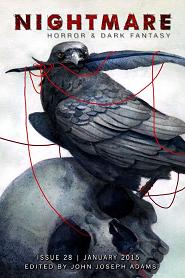Reviewed by Lillian Csernica
“The Trampled” by Christopher Barzak tells the story of a little girl in Victorian England who is on her way to call the doctor after her drunken father beats up her mother yet again. On her way, the little girl is literally trampled by this horrible dark force that resolves itself into a man who calls himself Hyde. A true gentleman named Enfield collars Hyde and forces him to make restitution for the harm he’s done to the little girl, which includes a broken arm. From here on the collection of the debt becomes farcical in the sense of how pointless it will be to give the little girl’s parents the means to heal her wounds and create a better life for them all. The little girl’s recovery is hampered by the shadows on her ceiling that keep gathering into a form that makes her scream with fresh terror.
The story is told in third person omniscient narrator, giving the reader glimpses into the minds of each character as that person’s thought and opinions become relevant. About halfway through the story, the narrative veers away from the little girl and her eventual plight. At this point the horror story is forced to give way to a larger view of how the underclass is exploited in the England of Queen Victoria and indeed in our present day by the international corporations which farm out their labor to Third World nations. The workers slave away in hazardous conditions for minimal wages. The story seems to say this was true in the days of Jekyll and Hyde and it’s true now. Jekyll and Hyde are still among us in the public face of the spin doctors justifying the policies of the corporations while in the unguarded darkness of the workers’ lives, Hyde is still there to trample them beneath the force of his mindless, selfish violence.
Is this a horror story? Is it really a nightmare in keeping with the theme of the magazine? The genre elements are certainly there, but the feelings, the mounting suspense, the tension and fright are diluted by the social commentary. The tone of the writing is cynical, almost merrily so, which conflicts with the tone of events at the opening of the story. Yes, the labor circumstances described in the story are nightmarish, but this isn’t exactly news. Dickens told the world about this in Oliver Twist. Robert Louis Stevenson told us all about the dichotomy of the human soul in The Strange Case of Dr. Jekyll and Mr. Hyde. More could have been done with the idea of Mr. Hyde as an elemental force, something fierce and strong and hungry enough to give Jack the Ripper serious competition.
“Returned” by Kat Howard is a modern take on the myth of Orpheus and Eurydice told from Eurydice’s point of view. The lady has quite a story to tell, putting the lie to the whole idea of Orpheus being such a gifted musician that he could call his lady love back from the depths of Hades itself. Eurydice wasn’t happy to be sent to Hades. Neither is she happy to be yanked back out into the living world to be gawked at by her lover’s legions of adoring fans. What seems to be a tragic love story whose modern retelling has a happy ending proves to be far worse than the loss explored in the myth.
I enjoy reading myths or fairy tales told from the perspective of a main character whose opinion is taken for granted by the original hero or heroine. This interpretation of Eurydice is a sympathetic heroine, all the more so for having been dragged back from death itself into a relationship that for her no longer holds anything like true love. The sensory details of dwelling in Hades are well done, especially Persephone’s kiss. The contrast of the living world with Hades is quite effective at bringing another layer of pain and wrongness to Orpheus’ insistence on salvaging his idea of the relationship. What has its roots in a Greek myth rings all too familiar to the ear of a modern woman who just wants that guy to leave her alone!
 Nightmare #28, January 2015
Nightmare #28, January 2015